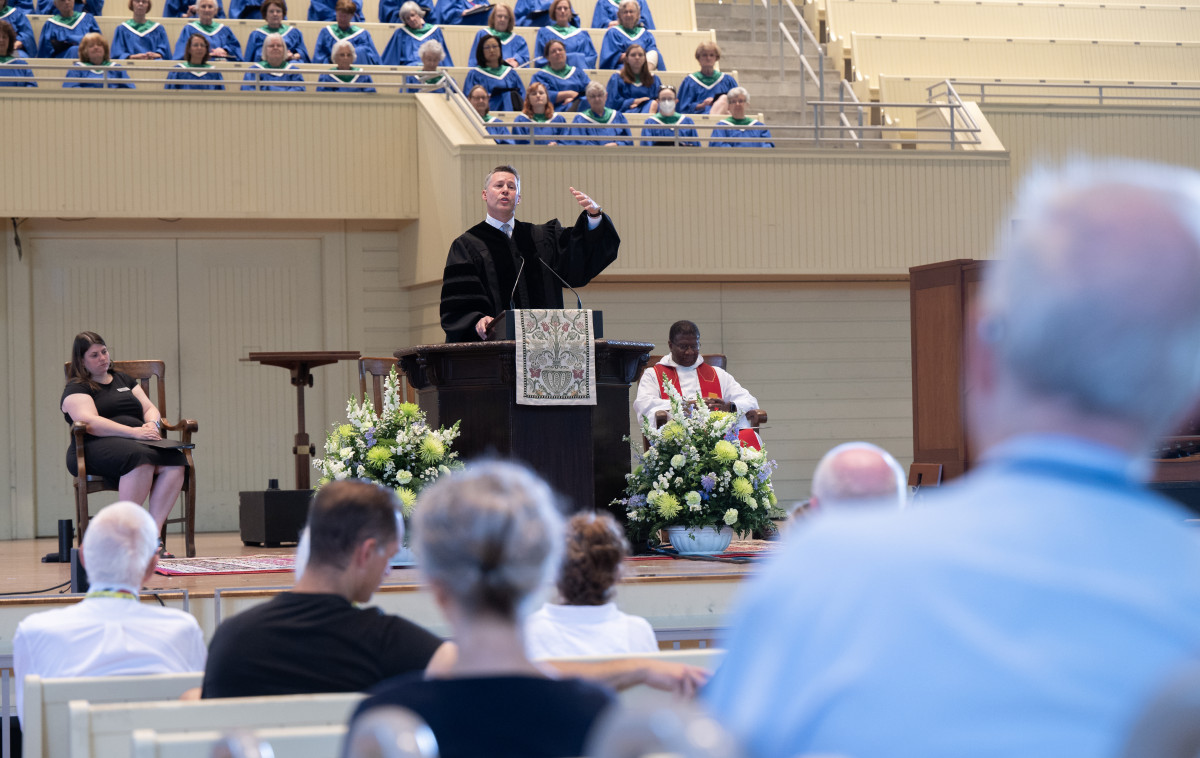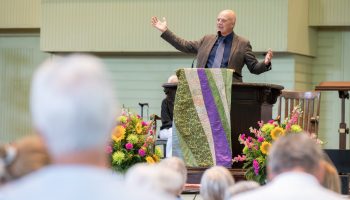
The Rev. Richard Kannwischer, senior pastor of Peachtree Presbyterian Church of Atlanta, opens his sermon series last Sunday in the Amphitheater; he concluded his week of preaching at Chautauqua Friday in the Amp with his sermon “What I Got Wrong About Faith.”
As they are with most chaplains in residence, Chautauquans are curious about what this week’s chaplain thinks about Chautauqua.
“I describe Chautauqua as a church camp for people who listen to NPR,” said the Rev. Richard Kannwischer. “I have found that some words are used as nouns and verbs. Like the word ‘porch.’ What would the world be like if you took ‘porching’ back to your home?”
Kannwischer preached at the 9:15 a.m. Thursday morning worship service in the Amphitheater. His sermon title was “What I Got Wrong about Friendship,” and the scripture text was Mark 2:1-12. The theme was “Because I Believe in the Holy Catholic Church, the Communion of Saints, I Will Not Walk Alone.”
U.S. Surgeon General Vivek Murthy has issued a report warning that the greatest health crisis in America is loneliness.
“In our isolation from one another, we are drifting apart and tearing each other apart,” said Kannwischer.
Kannwischer teaches a class to high school seniors “to inoculate them before they go to college.” He asks them to look at their smartphone settings and figure out the average amount of time they spend on social media each week.
“What is the result of this very unscientific survey? They spend an average of 20 hours a week doomscrolling on social media,” Kannwischer said. “That is a part-time job. They are trading convenience and stimulation for true relationships.”
He continued: “I am amazed at how much my daughters are at home. When I was growing up, home was the most boring place to be. People today are alone together, on their phones forever and everywhere and only paying partial attention to the people they are with.”
People don’t go to church today, he said, because it does not fit their lifestyle. It is not theology or disbelief or thinking the church is not valuable — it just does not fit.
In Genesis, “in the great song of creation, God sees what has been brought to life and calls it good,” Kannwischer said. “But in Genesis 2, before sin enters the picture, God says it is not good for us, in the broadest sense, to be alone. And God made us for each other. And God called that ‘very good.’ ”
Mark’s gospel gives a glimpse of the kind of friendship the church is supposed to provide. A man who is paralyzed, whose whole life is on a 3-foot-by-5-foot mat, who appears to have nothing, has great friends.
The friends heard of a rabbi who could restore those who are broken. They grabbed his mat and took him to Jesus. They had great confidence in Jesus.
Kannwischer asked the congregation: “Who do you let carry your mat for you? When can you relinquish control and be gloriously dependent on others?”
A man came to Kannwischer’s office one day and wanted to ask some questions about God. Kannwischer took about 45 minutes and talked with him about the very basics. Later that night, the man murdered his wife and son and committed suicide by stepping in front of a train.
“When I read that I was shattered. God had put him in my office and I missed it,” Kannwischer said. “I wanted to quit; I felt I had nothing left to give. One by one, my friends picked up a corner of my mat. They prayed when I could not. They believed when I could not. They loved when I could not.”
Again, he asked the congregation: “Who do you let carry your mat? The world is too dangerous and you are too fragile to go it alone.”
The friends of the paralyzed man could not get to Jesus, so they decided to remodel the house. They tore open the roof and lowered the man down before Jesus.
“What did Jesus see? He saw the faith of his friends. Jesus said nothing about the man. Never underestimate the tenacity of dear friends,” he said. “When was the last time you crashed through a roof for someone?”
Rebecca McLaughlin, author of Confronting Christianity: 12 Hard Questions for the World’s Largest Religion, moved to Boston and found herself very lonely. She realized that, as a Christian, she should not look for people who would love her, but ask “whom can I love?” and seek them out instead.
“Do we still crash through roofs?” Kannwischer asked the congregation. He told a story about his congregation in Summit, New Jersey, that answered the question with “yes.”
Andy Anderson was a young man living in Summit with his elderly father. Andy’s routine was to come to the church every day and, no matter what Kannwischer was doing, Andy would open his door, say hello, and then go on about his rounds in the church and around town.
For a variety of reasons, Andy wasn’t able to live alone. When his father died, the state of New Jersey wanted to move Andy into a care home, but the church decided that could not happen. The authorities, in response, told the congregation that they could not house Andy in Summit.
“The church started a rebellion,” Kannwischer said. “They called the senators and governor. They faxed the authorities until the authorities finally said, ‘Stop, just make it stop. Andy can stay in Summit.’ ”
Soon afterward, there was a Christmas banquet and Kannwischer and his wife Kelly went along with Andy. There, Andy met Kay. They fell in love immediately and Andy proposed a week later. Kay said yes, and they got married.
They went to Disney World for their weeklong honeymoon, but when they returned, Kay was not well. She went to the hospital for tests and the doctors found a malignant, fast-moving cancer. She never went home.
When Kannwischer talked with Kay’s father, a very wealthy resident of Summit, her father told Kannwischer that “Andy will never lack for anything. He is our child now.”
Kannwischer added, “When was the last time you heard of a church that was a society of mat carriers and roof openers?”
“Let’s expand the porches of Chautauqua,” he continued. “What are they for, redemptively? What will unlock the paralysis of a lonely world?”
The Rev. Mary Lee Talbot, Ph.D., one of the longest-serving Daily staff members in the newspaper’s recent history, presided. Willie LaFavor, chimemaster for Chautauqua Institution, read the scripture. The Motet Consort played “Finale,” from Sonate, by Joseph Woelfl. The consort included Barbara Hois on flute and LaFavor and Joseph Musser on piano. The congregation was blessed with three organists. Joshua Stafford, director of sacred music and the Jared Jacobsen Chair for the Organist, directed the Motet Choir in “O How glorious,” music by Philip Stopford and text from Revelation 7:9, paraphrased by Basil Harwood. Organ scholar Rees Taylor Roberts, assisted by organ scholar Owen Reyda, accompanied the choir on the Massey Memorial Organ. Stafford played “Sine Nomine,” by John Weaver, for the postlude. This week’s services and chaplaincy are supported by the Robert D. Campbell Memorial Chaplaincy and the Mr. and Mrs. William Uhler Follansbee Memorial Chaplaincy.




